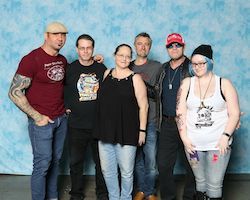| VFW Connections |
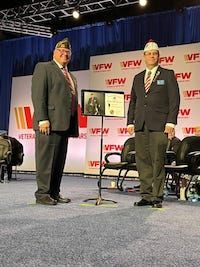 |
When Check was first out of the Army, he didn’t qualify for membership as a Comrade, as the VFW had not yet extended member eligibility to those who had served in Korea. However, his uncle was the Commander at a Post in North Carolina and informed Check of the expanded eligibility in 1997. He signed up to be able to enjoy some time with his uncle, but since he lived in Virginia, he never went to a meeting and his membership lapsed. In 2007, he again visited his uncle and signed up for another year. Finally, he came to Post 1503 in July of 1997 and signed up as a member with our former Commander, Tim Brown.
After joining, Check got involved with Post 1503 right away, volunteering for many events and projects. He also joined the Military Order of the Cootie as soon as he was eligible, participating in hospital visits, parades, and other special events. Check has served in numerous roles with the VFW and MOC, including as the Post Surgeon, Post Honor Guard, Assistant Bingo Manager, District Commander, District Trustee, MOC Pup Tent 14 Seam Squirrel, MOC Grand Commander, MOC Grand Hospital Chairman, MOC Supreme District 1 Hospital Commissioner, MOC Supreme Codeslinger, Department of Virginia IT Committee Chairman, and the Webmaster for the Post, District, and Department. Check currently serves as our Post 1503 Judge Advocate.
|
Check was born in East Point, Georgia, and moved to the nearby town of Fairburn shortly after. The family’s property was right at the division of the local land usage shift: the backyard faced the country area and included barbed wire to keep out the cattle; the front yard faced the city.
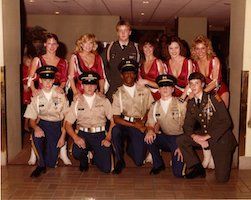
He was the only child of his parents, although Check didn’t know that until later, as his parents also raised his cousin—who was a few years older than Check—after his mother died. Check’s mother stayed at home to raise the children, and his father worked at Delta in the sheet metal shop. Check’s parents separated when he was 10 years old, so he lived with his father and other blended family members throughout his childhood. Although his mother moved to Louisiana after the divorce, Check was able to visit her several times a month due to the free flights his father received as a Delta employee. Check also enjoyed going to concerts as he was growing up.
Check notes that he was a "mediocre” student in his early years. Although an IQ test suggested that he should be identified as a gifted student (he's a member of Mensa), this specialized educational program wasn’t available at his local school. He often felt bored at school and rarely did his homework. This caught up to him in 8th grade when he failed his English class and was placed in a remedial program.
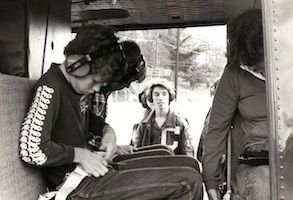
It was during this time that an unexpected scheduling complication would change his life. Check was enrolled in a guitar class for the 1st and 2nd quarter of the year. After that, he took a mixed band class. The next year, he was told he would take part in the marching band class. However, because Check had dabbled with many types of instruments without settling on any one of them, there was no way he would be prepared to march and play any of the available instruments. His principal gave him two options: participate in the marching band elective or join the Army JROTC program. Check made the decision to join the JROTC group for 9th grade.

It didn’t take long for Check to thrive in the program. By the end of his 9th grade year, he took on a leadership role as the Supply Sergeant. The next year, he was the S-4. His junior year, he was the S-3. He completed his senior year as the Brigade Commander in charge of all of Fulton County, Georgia. All four years, Check was part of the JROTC rifle team, color guard, and drill team, traveling to several states for competitions. He was the commander of the color guard. During 11th grade, he took 2nd place for color guard and drill team at nationals. He and another student also took 2nd place in the dual routine.
Military History
Thanks to his time with the JROTC program, Check had made up his mind to join the military by the time he had completed 9th grade. He signed up for the delayed entry program as soon as he could.
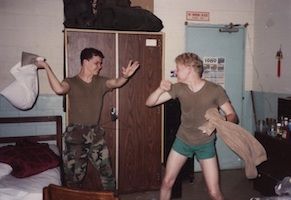
Although it seemed like officially signing up for the Army would be a simple formality, Check’s enlistment hit several snags along the way. On his first enlistment attempt, Check’s recruiter drove him to a hotel in downtown Atlanta, as he was supposed to complete the paperwork at MEPS the next morning. However, they discovered that his recruiter had not told him that he needed a parental consent form signed by a parent, as Check was not 18 years old yet. So, the recruiter had to bring Check home. They returned for another evening at a hotel for paperwork to be processed the next day. Check submitted his forms, completed his physical, and sat down to lock in his MOS.
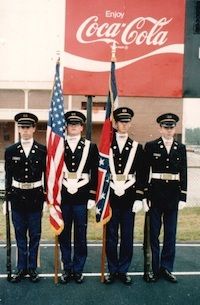
Previously, Check’s recruiter told him that he could sign up for his preferred job—a 74D Computer Operator. However, this position was not available, and Check decided to hold out for the job he wanted based on advice from his JROTC instructors. Again, Check’s recruiter had to bring him back home. Finally, Check received a phone call that the 74D MOS had an opening and he was able to complete his enlistment process.
Just two weeks before his 18th birthday, Check headed to Fort Knox, Kentucky, for Basic Training. Afterward, he travelled to Fort Benjamin Harrison in Indiana for AIT, which Check completed as the distinguished Honor Graduate. During enlistment, Check provided three options for his preferred duty stations for orders, his top choice being close to his family in Georgia. However, none of his preferences were selected by the branch manager. Instead, Check was sent to Yongsan in South Korea. His tour was originally for one year, but he extended his time there instead of accepting orders to New Jersey.
From there, Check received orders to the Pentagon for a year and a half. Although he had the option to re-enlist and continue at this duty station, the opportunity to continue his same job in a civilian role seemed much more promising for advancement.
Once his military enlistment was completed, Check joined a group of six others who were taking contractor jobs to do the same job he had done in the army in the same office. By the end of the first year, Check received a promotion. He spent a total of six years at the Pentagon.
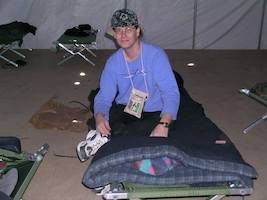
Check worked for a couple contractors at the Pentagon until a transition was needed for his company when they lost their contract. Check was one of the individuals who was chosen to be interviewed by the new company. He was surprised when he was interviewed by four separate people who inquired about his extensive skills. They quickly accepted his asking price due to his knowledge and experience, even though they weren’t certain where they would place him.
Over the next several years, the small company he had joined participated in many mergers and acquisitions. Check went from being a full-time computer programmer for a small company of about 200 to what would eventually be BAE Systems, a multi-national company that currently boasts 35,000 employees.
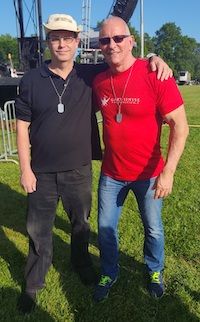
During this time, Check met Susan at a computer enthusiast social gathering. After several meetings, they started dating and eventually moved in together. They welcomed their daughter, Laura, in 1998.
When BAE lost the contract that he was working on, Check was hired by General Dynamics Information Technology, where he has worked for the past 10 years as a software engineer senior advisor.
As many know, Check has devoted a significant amount of time to the VFW organization from local to national levels. In most weeks he spends more time with VFW projects than his full-time job. In addition to his many volunteer and technological projects with the VFW, Check also hopes to ensure that no veteran is alone during a time of crisis.
After the new phone number for the Veterans Crisis Line, 988 then press 1, went live nationwide, Check discovered that most veterans and their family members weren’t aware of the new number. This is a resource that could provide immediate mental health services available during a time of need. Therefore, he turned to a familiar object for service members: the dog tag. He founded the 501(c)(3) nonprofit, Dog Tags 4 Life. This organization provides dog tags free of charge to veterans with the information about the Veteran Crisis Line. The dog tags provide a physical and auditory reminder that help is just a phone call away through the Veteran Crisis Line by calling 988 and then press 1.
Check looks forward to continuing to support our veterans through his VFW service and nonprofit projects.
- Check’s father had several long-term relationships after his divorce, which meant that Check got to grow up with many children who were like his siblings. As the children all varied in age, Check recalls that he got to be part of multiple sibling configurations (oldest child, youngest child, only child), but was never a middle child.
- You could say that Check took being a "frequent flyer” to a new level when he was younger. A couple times a month, he and his father would make the 30-minute drive to the Atlanta airport where Check would fly as an unaccompanied minor to visit his mother in Louisiana. One time, he forgot his school books during the trip. However, the Delta employees were able to get his books on the next flight out.
- There were also frequent flights for enjoyment during Check’s childhood. Check and his father would take a Delta flight up to Washington DC in the morning, jump on the Metro to visit the Smithsonian, enjoy a hot dog, and fly back that evening. The only cost for these trips would be the metro fare and a couple hot dogs!)
- Check’s mother enjoyed bringing him to concerts, but his father was more happy funding and facilitating when needed rather than attending. His first concert was at the age of 11 when he got to see ZZ Top. He also got to experience bands like Bon Jovi, Aerosmith, AC/DC, Iron Maiden, Ozzy Osbourne, Mötley Crüe, Ratt, Poison, and Queensrÿche. The 1980s hair metal bands were his favorite.
- Check took the ASVAB in 10th grade and wanted to retake it later in his high school career to improve his score. However, he was told he wasn’t allowed to retake it, as his outstanding score already allowed him to quality for any job in the military.
- Although Check loved computers from a young age—even when they required command prompt coding to use—he didn’t want to be a programmer in the military. It wasn’t until 1996 when he realized that he wanted to pursue his programming hobby as a full time profession.
- Since Check was only willing to enlist in the military if he could get the 74D Computer Operator MOS, the recruiting office had to get creative to reserve this position for him. They searched the availability frequently until a spot opened. Then, they put a fake name and social security number into the available slot, and quickly replaced it with Check’s information when he arrived to complete the enlistment process.
- Basic Training at Fort Knox seemed like a breeze for Check based on his JROTC experiences. During his summers between 9th-10th grade and 10th- 11th grade, his JROTC group travelled to Parris Island, South Carolina, where they went through the Marine Corps Boot Camp experience for a week each time. The students faced the obstacle course, rappelling tower, and the gas chamber. Many of them opted to get "high and tights” as their haircuts during his second summer there. Check remembers a single week of Marine Corps Boot Camp being far more challenging than his eight-week Army Basic Training after high school.
- The AIT grounds at Fort Benjamin Harrison, Indiana, were in excellent condition during Check’s time here. As this town had hosted the Pan American Games prior to Check’s arrival, the recruits enjoyed the former competition quarters as their barracks.
- During AIT, Check was in competition with another recruit to be the top Honor Graduate. They were neck-and-neck for each of their assessments and activities, both only missing one question until the final. The other soldier missed one question on his final assessment while Check earned a perfect score. However, this didn’t help him in getting any of his preferred duty stations from his branch manager.
- Earlier in Check’s career as a computer programmer, a company payroll file had a major processing error. As one of the few people who knew how to address such an issue, Check was asked to fix the confidential document processing. After repairing the financial file processing code, Check discovered that he was being paid significantly less than his peers. With this knowledge, Check was soon able to negotiate for several regular raises.
- In 1999, Check was the webmaster at HQ INSCOM and was asked to develop a database system for the company. The code he started writing that year is still being used by the organization today.
- Check got his nickname from his Army Drill Sergeant. His Drill Sergeant saw his name tag and demanded, "HOW DO YOU PRONOUNCE THAT ALPHABETS?” Check responded, "AdamCheck, Drill Sergeant.” His Drill Sergeant replied, "AdamCheck, huh? Well, I’m just gonna call you Check.” He’s been Check ever since.
